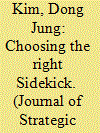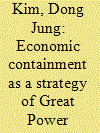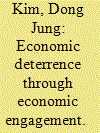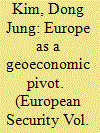|
|
|
Sort Order |
|
|
|
Items / Page
|
|
|
|
|
|
|
| Srl | Item |
| 1 |
ID:
188134


|
|
|
|
|
| Summary/Abstract |
The recent US emphasis on a geoeconomic confrontation with China in the developing states could spawn an economic version of the domino theory. Geoeconomic domino theory assumes that if Beijing’s economic influence is not stopped in a developing state, America might witness more developing states incorporated into the Chinese economic orbit. The falling economic domino eventually can reach the developed economies. Nonetheless, there are reasons to expect that the developing economies would not fall to China one after another. China’s gains in the developing regions in material capacity, ability to govern key issue areas, and ideological appeal are also dubious. In conducting geoeconomic competition with China, the United States should concentrate on the developed economies—Western Europe and Northeast Asia—that have a significant impact on the balance of power.
|
|
|
|
|
|
|
|
|
|
|
|
|
|
|
|
| 2 |
ID:
181320


|
|
|
|
|
| Summary/Abstract |
Many analysts and practitioners argue that the United States should actively engage in geoeconomic competition with China. This article suggests that an argument against this claim can be counter-intuitively derived from offensive realism – an influential international relations theory known for its pessimism on great power relations. Offensive realism suggests that a great power should try to maximize its material capacity and pay careful attention to the balance of material power between major states. It also suggests that a great power should avoid spending its limited resources in influence or legitimacy competition in the peripheries. In this context, offensive realism prescribes that the United States should not actively oppose Chinese economic initiatives unless those projects have meaningful impact on the bilateral balance of power and its security. On the contrary, Washington should encourage China to expand its investments in geoeconomic initiatives since China is likely to end up spending a large amount of its resources in regions that do not have significant implications to the balance of material power. For offensive realists, a great power should take balance of power competition in major regions seriously, not influence competition around the globe. Accordingly, the United States should restrain itself and avoid geoeconomically confronting China.
|
|
|
|
|
|
|
|
|
|
|
|
|
|
|
|
| 3 |
ID:
148224


|
|
|
|
|
| Summary/Abstract |
Scholars and practitioners of grand strategy agree that the use of military force should be supplemented by appropriate economic policies. However, strangely few accounts of economic complements to military grand strategies have been presented in recent discourse on US grand strategy. This paper takes a first step to fill this information gap. I first assess the role that could be played by economic measures under two types of grand strategies – one focusing on the balance of power and the other emphasising influence and order. Second, I introduce what I call ‘the influence-capability dilemma’ and discuss tradeoffs in adopting certain economic policies in order to help the US sustain pre-eminence in the international system. Third, I discuss how the US should address this dilemma of economic means in dealing with the rising China.
|
|
|
|
|
|
|
|
|
|
|
|
|
|
|
|
| 4 |
ID:
170403


|
|
|
|
|
| Summary/Abstract |
Economic containment has garnered repeated attention in the discourse about the United States' response to China. Yet, the attributes of economic containment as a distinct strategy of Great Power competition remain unclear. Moreover, the conditions under which a leading power can employ economic containment against a challenging power remain theoretically unelaborated. This article first suggests that economic containment refers to the use of economic policies to weaken the targeted state's material capacity to start military aggression, rather than to influence the competitor's behaviour over a specific issue. Then, this article suggests that economic containment becomes a viable option when the leading power has the ability to inflict more losses on the challenging power through economic restrictions, and this ability is largely determined by the availability of alternative economic partners. When the leading power cannot effectively inflict more losses on the challenging power due to the presence of alternative economic partners, it is better off avoiding economic containment. The author substantiates these arguments through case-studies of the United States' responses to the Soviet Union during the Cold War. The article concludes by examining the nature of the United States' recent economic restrictions against China.
|
|
|
|
|
|
|
|
|
|
|
|
|
|
|
|
| 5 |
ID:
164672


|
|
|
|
|
| Summary/Abstract |
This essay suggests that a state’s economic engagement with a potential military aggressor can be understood as an attempt to increase its deterrent capability. It first introduces the concept of economic deterrence and derives three strategies of economic deterrence from classic deterrence theory: (1) punishment, (2) denial, and (3) diminution. Next, it suggests that economic engagement can be employed to advance the ability, credibility, and communication for economic deterrence, as well as to create favorable conditions to adopt the three economic deterrence strategies. Finally, the essay discusses the requirements for effective employment of engagement policy for economic deterrence.
|
|
|
|
|
|
|
|
|
|
|
|
|
|
|
|
| 6 |
ID:
186200


|
|
|
|
|
| Summary/Abstract |
Intensifying strategic competition with China has introduced the need for the United States to consider extensive and stringent economic restrictions against the rising power. This article suggests that US economic containment of China is unlikely to materialise due to the presence of the EU states that are not militarily threatened by the geographically separated China and in a position to prioritise economic benefits in exchanges with that state. It first identifies the role of the EU in China’s foreign economic exchanges and addresses the ability of the EU states to replace the economic function of the United States in China. Then, it discusses how geographical conditions surrounding China make the rising state largely an East Asian threat. It suggests that, devoid of any direct military threat from China, the EU states can undermine the effectiveness of substantial US economic containment measures against China by functioning as alternative economic partners or facilitating China’s construction of alternative economic routes. Finally, this paper discusses the limitations in US ability to constrain the EU states’ economic exchanges with China. While concerns grow over Washington’s economic assertiveness against Beijing, the feasibility of a US-led upheaval in economic relations involving China should be carefully gauged.
|
|
|
|
|
|
|
|
|
|
|
|
|
|
|
|
| 7 |
ID:
165281


|
|
|
| 8 |
ID:
169674


|
|
|
|
|
| Summary/Abstract |
DONG JUNG KIM analyzes why Britain did not respond militarily to the United States’ massive territorial expansion during the period of 1836–1848. Building on leading theories of great power politics, he argues that three considerations constrain a leading power’s military behavior against a rising power.
|
|
|
|
|
|
|
|
|
|
|
|
|
|
|
|
| 9 |
ID:
163260


|
|
|
|
|
| Summary/Abstract |
This article suggests that a powerful defence for open trade can be derived from offensive realism. Offensive realists posit that a state tries to maximize its relative material power in order to protect its security in the dangerous international realm. I argue that with regard to trade, relative power maximizing states have strong incentives to maintain free trade. Mainstream trade theories commonly suggest that an important mechanism through which trade affects a state's material capacity is specialization, which advances trading states' allocative and productive efficiency. When specialization is prioritized, the international trade structure is likely to be composed of multiple players, or be ‘multipolar’, and protectionist states are likely to encounter significant relative losses vis-à-vis other states. In the multipolar trade structure, even when a state is facing relative losses from existing commercial exchanges, employing extensive protectionist policies would weaken the state's relative power as it would incur even larger relative losses. In the offensive realist world where the failure to maximize relative power is dangerous, protectionism needs to be avoided precisely because it does not allow for power maximization. This argument is substantiated by an examination of the United Kingdom's decision to avoid protectionism during the decades leading up to First World War.
|
|
|
|
|
|
|
|
|
|
|
|
|
|
|
|
| 10 |
ID:
152091


|
|
|
|
|
| Summary/Abstract |
This paper examines whether the US is in a position to adopt restrictive commercial measures against China in order to complement military balancing. It focuses on the necessary condition for serious economic measures against an adversary: the state needs to be sure that it can effectively diminish the adversary's economic performance more than its own. This essay suggests that Washington cannot ascertain that this necessary condition is met in its relations with China. Thus, it might be better for the US to avoid restricting trade with China in any meaningful way, even though bilateral security rivalry intensifies.
|
|
|
|
|
|
|
|
|
|
|
|
|
|
|
|
| 11 |
ID:
194502


|
|
|
|
|
| Summary/Abstract |
Structural realists accuse U.S. economic engagement with China as a mistake driven by liberal idealism and lack of realism. I suggest that this increasingly popular narrative reflecting the traditional idealism-realism distinction is misplaced. First, liberal approaches to international relations can clash with each other when a democratic state engages with an authoritarian state, and engagement is justified by one strand of liberalism—economic interdependence liberalism—whereas a different liberal perspective—democratic peace liberalism—opposes economic engagement with an oppressive regime. Second, realism—in particular, structural realism—posits that important state behaviors reflect the need to attain more relative power than others. Then, if economic engagement better serves a state’s relative capacity vis-à-vis other states, economic exchanges with a potential strategic contender would be an unavoidable choice. The liberal case for economic engagement is much more restrictive than it is often articulated, while a structural realist case for engagement can be convincingly made. For about two decades since the mid-1990s, U.S. administrations defended economic engagement with China not only with economic interdependence liberalism but also by utilizing an argument in line with the structural realist case for engagement. Blaming one foreign policy idea as responsible for today’s strategic difficulties is misleading.
|
|
|
|
|
|
|
|
|
|
|
|
|
|
|
|
| 12 |
ID:
188662


|
|
|
|
|
| Summary/Abstract |
This article examines a US security client’s decision to support an international institution led by a challenger to its patron’s leadership position in the international system. Two factors together shape the client’s decision: (i) the nature of the institution led by the challenger and (ii) the position of the client in the regional security environment. I argue that a challenger-led institution that aims to complement rather than compete with the institutional framework of the US-led order is likely to be supported by the client that is only facing a diffused security concern from the challenger. In contrast, the challenger’s institution that is designed to compete with US-led institutions will not be supported by the client that is facing a specific security concern from the challenger. This argument is substantiated by case studies of Japanese and South Korean responses to two China-led institutions between 2014 and 2016.
|
|
|
|
|
|
|
|
|
|
|
|
|
|
|
|
|
|
|
|
|